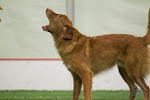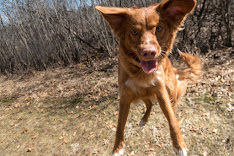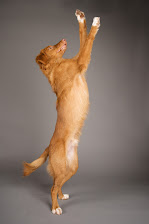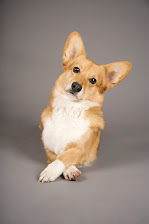Replicating Trial Issues
At the last obedience trial I had the opportunity to talk to a few exhibitors who asked me for advice on fixing some problems.
One of the exhibitors had a problem on her retrieves and she was also having the same problems during practice unless she managed it by having the dog on leash. I'm not sure what miracle method people expect to happen if you consistently need to do something in training in order to get the behavior! Positive trainers are definitely not exempt, as I know many people who need to have the food on their body in order for the dog to do the behavior!
So first take an honest look at your training and ask yourself if you are doing something to mask the issue in practice. Can the dog do it correctly the first time you ask? Can the dog do it if you are being formal like in a ring?
If you find you are masking the issue in practice, it doesn't necessarily mean you have to stop trialing. That depends on your goals and your realistic expectations. I know that even in practice Lance might start to turn and sit before he touches the gate on a go out. He doesn't do it often, but it shows up enough that it is something we regularly work on and do lots of proofing with. I also know that in a trial this tendency will be exaggerated and thus when Lance starts to turn before I cue a sit I can't be surprised or upset. I can cue him to "touch" again though if I want to be consistent and try to save it from increasingly happening in future runs!
If you are not seeing your issue in practice and it only shows up in trials there can be a few reasons.
- *Stress, from the dog or human
- Differences in arousal
- Formality
- Anticipation, dog knows the routine
- Pressure from the judge or stewards
- Reliance on rewards
If you have hope of fixing the issue in the ring you need to find some way to replicate the issue in practice. I put a * by stress because often if it is purely a stress issue and if you find a way to reduce the stress then the issue goes away. And I would venture to say that most trial only issues are stress related. But reducing stress can be hard, thus my Ring Confidence classes. If the stress is limited to a single exercise and you're only seeing that stress in trials, I still focus in trying to replicate the issue in practice and teaching the dog how to work through it.
I find that a lot of people don't try hard enough to uncover the issue in practice. I can often get the exercise to fail after just poking a few tiny holes.
Dog anticipates in trials? Try doing that portion of the exercise several times in a row. The dog who likes to drop before being cued on the DOR might need practice with come-down repeated with the down in the exact same place each time. It's a very solid dog who doesn't start to lie down in that spot when you finally don't ask for it! You often don't need to do the exercise in it's completion to replicate the issue. Repeated cookie toss-downs often work just as well!
Just don't avoid repetition if you have an anticipation issue. Never doing the drop in practice is a very weak band aid!
Dog becomes grabby on scent articles only in trials? Try adding lots of arousal to your practice. Here you can see the boys successfully doing articles with high arousal.
And then here is Vito when I used a ball as a reward. I was wrong and he was not ready for this! You can tell how the extreme arousal totally causes both the inability to make a choice and then just grabbing. I will have to work through this issue more gradually, likely by having the ball off my body and at a greater distance. (Ball send begins at 55sec)
Perhaps the issue is the opposite and the dog is in too low of arousal in trials on say the signal exercise. Can your dog do signals just around the house when they're tired and not expecting it?
If the issue is one of formality, do you practice long pauses in your practice? It might be that you are doing your signals immediately vs pausing and waiting the time it takes for the judge to signal. Or simply breaking eye contact with your dog to look at the judge is enough to cause the issue to occur.
Dog not wanting to front in a trial? Try adding people pressure of a judge standing close to check your front. No helpers? Substitute a high valued reward just behind the dog that is hard for the dog to keep their back to.
You can see how there are many ways to add proofing to try to unearth the cause of your dog's trial issues. In all of it, make sure that while you are trying to replicate the issue, the goal is to still to increase your dog's confidence with the exercise. It's less about "gotcha" and more about Dr. Seuss "Can you do it when__________?" It's a fine line between building their confidence and tearing it down.
When in doubt I often reward the dog for their mistake! A mistake just gives me information about where they are at. By rewarding the dog for continuing to try I avoid adding continual stress onto the problem area. The dogs easily differentiate between my "pity cookie" and my very excited rewarding for actually doing it correct.





